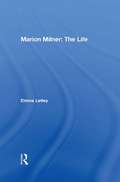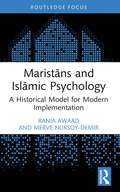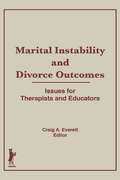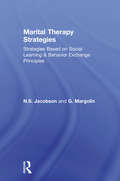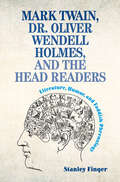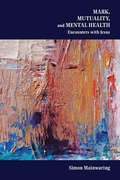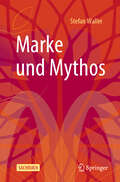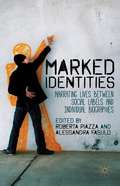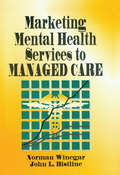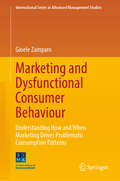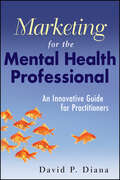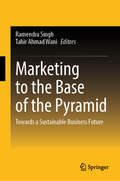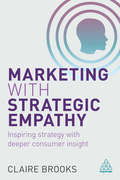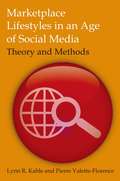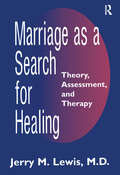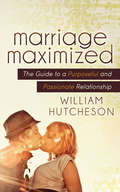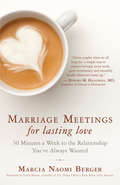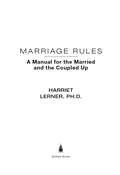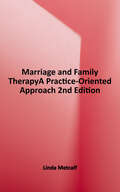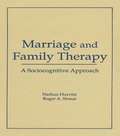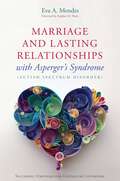- Table View
- List View
Marion Milner: The Life
by Emma LetleyArtist, poet, educationalist and autobiographer, Marion Milner is considered one of the most original of psychoanalytic thinkers whose life (1900-1998) spans a century of radical change. Marion Milner: The Life, is the first biography of this extraordinary woman. It introduces Milner and her works to the reader through her family, colleagues and, above all through her books, charting their evolution and development as well as their critical reception and contribution to current twenty-first century debates and discourses. In this book Emma Letley draws on primary sources, including the newly-opened Marion Milner Collection at the Archives of the British Psychoanalytical Society in London, as well as interviews and the re-contextualised series of Milner texts. She traces the process of Milner's writing of her books, her discovery of psychoanalysis, her training and her place in that world from the 1940's onwards. Marion Milner: The Life includes discussion of Milner's connection with D.W. Winnicott and her emergence as a most individual member of the Independent Group. Letley also shows how Milner's Personal Notebooks offer fascinating insights into her relationships, both personal and professional, and into many of her important ideas on creativity, the body-mind relationship, her revolutionary ideas on education and her particular personality as clinician working with both children and adults. Further, Letley explores Milner's literary character from her very early diaries and narratives to her last book written in her 90's published in 2012. Marion Milner: The Life places Marion Milner firmly in her Edwardian family setting and contains new material from primary sources, including a new view of her collegial connections. It provides a wealth of material on her life and works that will be invaluable to psychoanalysts, psychotherapists, art psychotherapists, students, those involved with life writing and autobiography, and the general reader.
Maristāns and Islāmic Psychology: A Historical Model for Modern Implementation (Islamic Psychology and Psychotherapy)
by Rania Awaad Merve Nursoy-DemirMaristāns and Islāmic Psychology outlines how the novel methods, tools, and approaches for treating psychological illnesses developed in the maristāns (hospitals) of the Muslim world can be utilised today in formulating a practical implementation of Islāmic psychology (IP). As a trademark of the Islāmic Civilisation, the maristāns were institutions of healing that boasted the world’s first treatment centres for treating psychological illnesses. They also served as the centres where theoretical concepts developed by early Muslim scholars—physicians, theologians, and philosophers—who contributed to the creation of IP were translated into practical, clinical applications.A detailed examination of the treatment modalities within these historical treatment centres provides a promising model for creating a holistic approach to psychological healing that is grounded in Islāmic heritage. This text completes such an examination, highlighting the practical IP treatment methods in fourteen maristāns geographically spread throughout the Muslim world in order to bridge this centuries-long model of psychological care to the modern context.As part of the Islāmic Psychology and Psychotherapy Focus series, this book provides a foundation for mental health professionals who either directly deliver mental health services or are involved in creating theories, institutions, or spaces of IP and psychotherapeautic practices.
Marital Conflict and Children
by Patrick Davies E. Mark CummingsFrom leading researchers, this book presents important advances in understanding how growing up in a discordant family affects child adjustment, the factors that make certain children more vulnerable than others, and what can be done to help. It is a state-of-the-science follow-up to the authors' seminal earlier work, Children and Marital Conflict The Impact of Family Dispute and Resolution. The volume presents a new conceptual framework that draws on current knowledge about family processes; parenting; attachment; and children's emotional, physiological, cognitive, and behavioral development. Innovative research methods are explained and promising directions for clinical practice with children and families are discussed.
Marital Instability and Divorce Outcomes: Issues for Therapists and Educators
by Craig EverettClinicians and educators in the marriage and family field will gain valuable insight into the relationship dynamics that cause marital stress and the interactional factors that may result in divorce from this excellent book. The perceptive theoretical, empirical, and clinical chapters included in Marital Instability and Divorce Outcome examine why certain elements in relationships result in divorce while others do not and assist professionals in evaluating these elements. Specifically, this provocative volume enables professionals to examine how a marriage has weathered developmental periods of stability and instability, whether or not it has the necessary resources to survive, and, in the event a divorce occurs, what will be the most likely post-divorce adjustment for the marriage partners. This informative volume aids professionals in their work with marital relationships, by covering a wide range of topics involved in assessing marital instability and divorce outcomes. The relationship circumstances that can lead to divorce are examined in an investigation of personality types which are prone to divorce and a comparison of patterns of relationships which are stable and those which are likely to result in divorce. The conditions that exist after a divorce are explored in a discussion on how to predict post-divorce adjustment and physical well-being of the marriage partners after divorce. Educators teaching marriage and family courses at all levels from high school to college and clinicians who work with marital, family, and child cases will find this helpful volume to be an invaluable resource for evaluating factors influencing marital instability and divorce outcome.
Marital Tensions: Clinical Studies Towards a Psychological Theory of Interaction (Psychology Revivals)
by Henry V. DicksOriginally published in 1967, this book gathers together the various aspects of Dr Dick’s theoretical and clinical approach to marriage difficulties into a coherent system for the benefit of professional workers and students who were concerned with family and community psychiatry and case work at the time. He preserves the essentials of the steps by which his concepts developed from one-person therapy into hypotheses for understanding interaction, with the couple as the unit of study.
Marital Therapy Strategies Based On Social Learning & Behavior Exchange Principles
by N.S. Jacobson G. MargolinThe techniques described here are the familiar ones of establishing contracts and contigencies and training in communication and problem-solving skills. As the reader will see, these techniques are eminently teachable. The fact that they are described here and that they are teachable suggests that clinical technology has stepped forward a long way from the arcane mysteries which characterized psychotherapy efforts in the late 1950s and early 1960s. The aspect of this work which sets it clearly in the forefront is the emphasis upon soft clinical skills as being a necessary .
Mark Twain, Dr. Oliver Wendell Holmes, and the Head Readers: Literature, Humor, and Faddish Phrenology
by Stanley FingerHaving a phrenological 'head reading' was one of the most significant fads of the nineteenth century – a means for better knowing oneself and a guide for self-improvement. Samuel Clemens (Mark Twain) had a lifelong yet long overlooked interest in phrenology, the pseudoscience claiming to correlate skull features with specialized brain areas and higher mental traits. Twain's books are laced with phrenological terms and concepts, and he lampooned the head readers in Tom Sawyer and Huckleberry Finn. He was influenced by Dr. Oliver Wendell Holmes, who also used his humor to assail head readers and educate the public. Finger shows that both humorists accepted certain features of phrenology, but not their skull-based ideas. By examining a fascinating topic at the intersection of literature and the history of neuroscience, this engaging study will appeal to readers interested in phrenology, science, medicine, American history, and the lives and works of Twain and Holmes.
Mark, Mutuality, And Mental Health: Encounters With Jesus
by Simon MainwaringMainwaring explores the societal contexts of those who suffer poor mental health, and in particular the relational dynamics of how identity, agency, and dialogue are negotiated in personal encounters. This work seeks to serve as an experiment, such that interested readers might better understand the dynamics of relational power that pervade encounters with persons with poor mental health. Features: Foucauldian analysis of the relational dynamics of poor mental health used to re-imagine hegemonic relational dynamics Close readings of encounters between individual characters to evaluate how mutuality operates in those encounters Study of mutuality as it has emerged in mental health literature, feminist theologies, and theologies of disability
Marke und Mythos
by Stefan WallerMarke und Mythos.Eine kulturphilosophische BetrachtungIn Marken treten die Sehnsüchte des modernen Menschen hervor. In Nike die Hoffnung darauf es zu schaffen, wenn man es nur einfach tut; in einem Mercedes das Streben nach Status und in einer Master-Card verdichtetet sich die Sehnsucht nach denjenigen Momenten, die man für Geld nicht kaufen kann (für die man aber doch welches braucht). Die Liste kann man noch sehr lange fortsetzen. Trotzdem diese Markenbotschaften in den verschiedensten Kulturen verstanden werden, fuhren sie in der kulturphilosophischen Debatte ein Schattendasein. Professionellen Denkern erscheinen Marken im harmlosesten Falle als banal und im schlimmsten Falle als Instrument in einem malignen Verblendungszusammenhang. Als Ausdruck des Kapitalismus allemal, dem man kritisch, und das heißt ablehnend gegenübersteht. In einer neutraleren Haltung wird die Beschäftigung mit Marken als Gegenstand von Betriebswirtschaft, Marketing und Design verstanden und damit außerhalb der eigenen Kompetenz angesiedelt.
Marked Identities
by Roberta Piazza Alessandra FasuloWestern society has become increasingly diverse, but stereotypes still persist in the public discourse. This volume explores how people who have a marked status in society - among them Travellers, teenage mothers, homeless people - manage their identity in response to these stereotypes.
Markers of Psychosocial Maturation: A Dialectically-Informed Approach
by Mufid James HannushThis book advances an integrative approach to understanding the phenomenon of psychosocial maturation. Through a rigorous, dialectically-informed interpretation of psychoanalytic and humanistic-existential-phenomenological sources, Mufid James Hannush distils thirty essential markers of maturity. The dialectical approach is described as a process whereby lived, affect-and-value laden polar meanings are transformed, through deep insight, into complementary and integrative meta-meanings. The author demonstrates how responding to the call of maturation can be viewed as a life project that serves the ultimate purpose of living a balanced life. The book will appeal to students and scholars of human development, psychotherapy, social work, philosophy, and existential, humanistic, and phenomenological psychology.
Marketing Mental Health Services to Managed Care
by William Winston Norman Winegar John BistlineManaged care is rapidly making traditional marketing strategies for mental health services obsolete. Here is the definitive book that helps professionals understand contemporary market forces and how to reshape marketing strategies in an increasingly competitive environment.Marketing Mental Health Services to Managed Care begins by demystifying the seemingly bewildering world of managed care systems. It enables the reader to become a fully informed partner in providing services for managed care systems. In an era in which many professionals are affiliated with one or more managed care networks, this book guides clinicians toward greater control of their professional futures by providing the steps necessary to develop a successful managed care oriented practice strategy. It will be especially helpful to the newcomer to practice in the 1990s or the seasoned practitioner interested in increasing referrals from managed care systems.Readers of this highly practical new book learn how to analyze the market for clinical services, how to plan and develop services for the managed care market, and how to sell professional services in an era dominated by active payor entities. The increased importance of automation, group practices, and effective office management skills are discussed. Although of particular value to outpatient practitioners, Marketing Mental Health Services to Managed Care also discusses marketing strategies and revenue generating ideas for inpatient mental health and substance abuse treatment facilities. Program managers, administrators, and marketing professionals in the hospital industry will find this book a valuable investment.Of special interest to all readers are chapters addressing the impact of managed care systems--with their focus on accountability, cost-effectiveness, and quality--upon traditional clinical paradigms. Brief therapy skills and techniques are discussed by these two veteran clinicians and writers. Emerging clinical innovations and effective reimbursement strategies are also discussed in this remarkable new book. A resource section, managed care company directory, and a glossary of terms make this a practical guidebook of long-lasting value to professionals from many disciplines. College professors and graduate students will also find Marketing Mental Health Services to Managed Care a valuable introduction to marketing professional services in the managed care dominated marketplace for healthcare today.
Marketing and Dysfunctional Consumer Behaviour: Understanding How and When Marketing Drives Problematic Consumption Patterns (International Series in Advanced Management Studies)
by Gioele ZamparoThis book explores the relationship between marketing practices and dysfunctional consumption behaviors, specifically focusing on two behavioral addictions: compulsive buying and problematic gambling. It offers a comprehensive analysis grounded in marketing theory, examining how marketing strategies and actions can significantly influence these behaviors. Using a mixed-method approach, the book reviews existing literature and presents empirical findings related to compulsive buying and gambling. It also discusses the implications of marketing’s role in fostering these behaviors, aiming to inform both academic discourse and the responsibilities of marketers. This work is essential for scholars and practitioners seeking to understand dysfunctional consumer behaviors and the impact of marketing strategies on consumer well-being.
Marketing for the Mental Health Professional
by David P. DianaA hands-on guide to building a successful mental health practice There is real opportunity for growth, advancement, and overall success within the mental health profession. Marketing for the Mental Health Professional helps you acquire and apply the powerful, proven sales and marketing techniques and strategies needed to create and cultivate a thriving mental health practice. Filled with real-life stories and helpful tips, this book provides you with the tools to build your practice, including guidance on: Using customer-based selling to create a thriving practice Developing effective strategies for engaging clients, building credibility, and earning loyalty Identifying true prospects that will lead to long-term success Using power, influence, and persuasion to help grow your practice Creating an impression and being remembered Using Internet technology to start a conversation and build relevance A practical guide for professionals looking to achieve long-term success in the field, Marketing for the Mental Health Professional proposes a different way of thinking about the profession. It leverages and incorporates key business, sales, and marketing principles that "best in class" organizations and sales/marketing professionals use to generate an increase in market share, financial wealth, and overall achievement.
Marketing to the Base of the Pyramid: Towards a Sustainable Business Future
by Ramendra Singh Tahir Ahmad WaniThis book is a collection of nine chapters discussing the impact of sustainable marketing and business practices on the stakeholders at the base of the pyramid (BoP). It explores multifaceted dimensions related to sustainable practices such as sustainable consumer behavior, marketplace literacy for low-income and low-literate consumers, innovation and BoP and emerging markets, bridging vulnerability and sustainability, inclusive marketing practices, and how to bridge the economic, social and environmental aspects of sustainability. These chapters have been authored by the best marketing scholars working in the domain of marketing at the base of the pyramid, including scholars who actively promote bottoms up approach to enhance well-being and prosperity of subsistence marketplaces. Primarily aimed at marketing scholars, another important objective of this edited book is to reach out to organizations looking for deeper insights on how they can successfully position their products and services to poor consumers, or even how they can purchase/source products and services from poor producers. Professional associations such as ASSOCHAM, CII, FICCI, AIMA, AMA would also find many relevant takeaways in the book, as would academicians and policymakers of developing nations in Asia, Americas and Africa.
Marketing with Strategic Empathy: Inspiring Strategy with Deeper Consumer Insight
by Claire BrooksWe are living in an age of continual motion and change, and as a result traditional strategy planning has become outmoded. Every manager, perhaps even every employee, needs to become a strategist. Every strategist, in turn, needs to develop deep consumer insight - or empathy - as a basis for flexible strategy formation. This book offers a practical guide on how to develop and implement a systematic process of strategic empathy to lead to greater effectiveness and day-to-day success. Marketing With Strategic Empathy is written by Claire Brooks, the CEO of the global consulting firm where the strategic empathy framework and processes were developed. She has applied these in many successful projects for international corporations for more than 10 years.
Marketplace Lifestyles in an Age of Social Media: Theory And Methods
by Lynn R Kahle Pierre Valette-FlorenceThis book approaches the concept of lifestyle from a contemporary scholarly perspective, and subjects it to rigorous theoretical and conceptual standards from an integrated, applied psychological point of view. Marketplace Lifestyles in an Age of Social Media is exceptionally current, demonstrating how recent trends and developments in social media reflect the importance of lifestyle research in marketing. Numerous examples, illustrations, and comprehensive references are provided, making this volume the best single resource for scholars, students, and marketing experts in this important area of marketing theory and practice.
Marriage A Search For Healing
by Jerry M. LewisFirst published in 1997. Routledge is an imprint of Taylor & Francis, an informa company.
Marriage Maximized: The Guide to a Purposeful and Passionate Relationship
by William HutchesonMarriage Maximized helps couples whose marriages have drifted off track, steer them back onto the path to happiness. With thirty-eight years of experience helping nearly-weds and established couples, William Hutcheson is ready to help married couples have the happy relationship God intended for their marriage. In Marriage Maximized, couples learn:A transformative, new definition of love that promises to renew their marriageThe secret that turns personality differences from stresses into strengths How to ensure romance in their marriage – yes, that’s a guarantee! Communication strategies to resolve all those little misunderstandings (without the fights!) The importance of taking marriage fun seriously Why their marriage happiness quotient tanked – and how to get it back
Marriage Meetings for Lasting Love: 30 Minutes a Week to the Relationship You've Always Wanted
by Marcia Naomi BergerMost couples — because they watch so many of their peers divorce and are themselves the products of failed marriages — don't have many successful long-term-relationship role models. Parenting and communication issues are perennial, while some challenges, like increasingly 24-7 work lives and economic hardships, mark the current decade. Despite all this, psychotherapist and clinical social worker Marcia Naomi Berger asserts that most couples can make love last — they just need to learn how. Berger answers this need with a deceptively simple prescription: have an interruption-free thirty-minute (or even shorter) meeting each week and follow an agenda that includes the kind of appreciation and planning for fun that foster intimacy and pave the way for collaborative conflict resolution. Berger has refined these techniques while working with hundreds of couples — with results that are both practical and profound.
Marriage Rules: A Manual for the Married and the Coupled Up
by Harriet LernerFollowing a unique format perfect for today's world, the renowned author of The Dance of Anger gives us just over 100 rules that cover all the hot spots in long-term relationships. Marriage Rules offers new solutions to age-old problems ("He won't talk"/"She doesn't want sex") as well as modern ones (your partner's relationship to technology. ) You'll also learn how to: Calm things down and warm them up Talk straight and fight fair Listen well as a spiritual practice Connect with a distant partner Survive the unique challenges of children, stepchildren and difficult- laws Follow a 12-step program to overcome defensiveness Know how and when to draw the line Take back your marriage when things fall apart Marriage Rules is a treasure chest of lively, practical advice to help you navigate your couple relationship with clarity, courage, and joyous conviction. If one person in a couple follows ten rules of his or her choice, it will generate a major, positive change. All that's required is a genuine wish for a better relationship and a willingness to practice. .
Marriage and Family Therapy: A Practice-Oriented Approach
by Linda MetcalfThis text provides students of family therapy with a unique opportunity to understand and compare the inner workings of 14 traditional and non-traditional family therapy models. The book demonstrates, through innovative " guiding templates,"" how the different therapeutic models are applied in an actual family therapy situation. The second edition features a new chapter on neuroscience, new interviews with master therapists on topics such as LGBT families, EMDR and research, and coverage of ethical issues concerning electronic safety and telephonic therapy. Overviews of every model include history, views of change, views of the family, and the role of the therapist. Chapters on every model also provide responses to one, realistic case study with commentary and analysis by master therapists to illustrate how each one addresses the same scenario. Interviews with master therapists illustrate how each mode of therapy actually ""works"" and how therapists ""do it."" Print version of the book includes free, searchable, digital access to the entire contents New to the Second Edition: - Examines neuroscience and its role in family therapy - New chapter on solution focused narrative therapy with families - Includes enhanced coverage of self-care and mindfulness for the therapist - Contains educator resources including instructor's manual, PowerPoint slides, and a test bank - Updated references provide current developments in the field of marriage and family therapy - Provides insight on submitting research articles for publication through an interview with a current journal editor - Reports on current, revised ethical guidelines from the AAMFT Key Features: - Provides a guiding template for each family therapy model from assessment through termination - Describes a practice-oriented approach to family therapy - Uses a single case study throughout the book where different approaches to therapy are applied by master therapists - Introduces the theory, history, theoretical assumptions, techniques, and components of each model - Includes numerous interviews, case study commentary, and analyses by master therapists.
Marriage and Family Therapy: A Sociocognitive Approach
by Terry S Trepper Roger A Straus Faye HurvitzMarriage and Family Therapy: A Sociocognitive Approach is a comprehensive and clearly written introduction to sociocognitive therapy. It is rich with transcripts and case examples, culled from the authors’more than thirty-five years of practice, providing you with valuable background information on helping difficult-to-reach and hard-to-help populations. In practical language, this volume takes you step-by-step through methods of assessment and change that are useful in traditional and nontraditional families and couples. With clear language and taxonomy for family troubles and their resolution, Marriage and Family Therapy provides conceptual handles to guide you in learning intervention strategies, enabling you to work effectively with, most notably, lower working-class and poor inner-city, African-American families. A highlight of the book is the detailed look at terminal and instrumental interaction hypotheses and how they can be applied in actual therapy situations. With Marriage and Family Therapy as a guide, you will develop multiple skills and methods that equip you to better handle the challenging task of helping troubled families and couples.The first two chapters present the theoretical framework of the sociocognitive approach. In the third chapter, the assessment and change concepts central to Dr. Hurvitz's approach are introduced. The last four chapters show how these humanist principles are applied through the phases of opening, change-producing, and termination in therapy, creating an invaluable book for marriage and family therapists, social workers, psychologists, and educators.
Marriage and Family in Modern China: A Psychoanalytic Exploration (The Library of Couple and Family Psychoanalysis)
by David E. ScharffMarriage and Family in Modern China is a groundbreaking psychoanalytic examination of how 70 years of widespread social change have transformed the intimacies of life in modern China. The book describes the evolution of marriage and family structure, from the ancient tradition of large families preferring sons, arranged marriages and devaluation of girls, to a contemporary dominance of free-choice marriages and families that now prefer to remain small even after the ending of the One Child Policy. David Scharff uses extensive reports of his psychoanalytic interventions to demonstrate how the residue of widespread trauma suffered by Chinese families during past centuries has interacted with the effects of rapid modernization to produce new patterns of individual identity, personal ambition and family structure. This wholly original book offers new insight into Chinese families for all those interested in psychoanalytic psychotherapy and in the intricacies of Chinese domestic life.
Marriage and Lasting Relationships with Asperger's Syndrome (Autism Spectrum Disorder): Successful Strategies for Couples or Counselors
by Stephen M. Shore Eva A. MendesProven counseling strategies that will help improve the relationships of married, long-term or co-habiting couples with Asperger's Syndrome (Autism Spectrum Disorder). ASD relationship expert Eva A. Mendes provides advice straight from the couples' counselling room that can be applied in day-to-day living and help with the challenges that can arise in relationships where one or both partners are on the autism spectrum. This includes issues surrounding diagnosis, mental health, sexual compatibility, sensory needs, executive functioning, theory of mind, communication, and co-parenting. She offers unique practical ideas for positive change such as creating a relationship schedule, making expression of appreciation and gratitude a part of every day, and finding mutually satisfying activities and special interests to engage in with your partner. The strategies in this book will be useful to couples themselves and any couples' counselors or therapists working with them.
